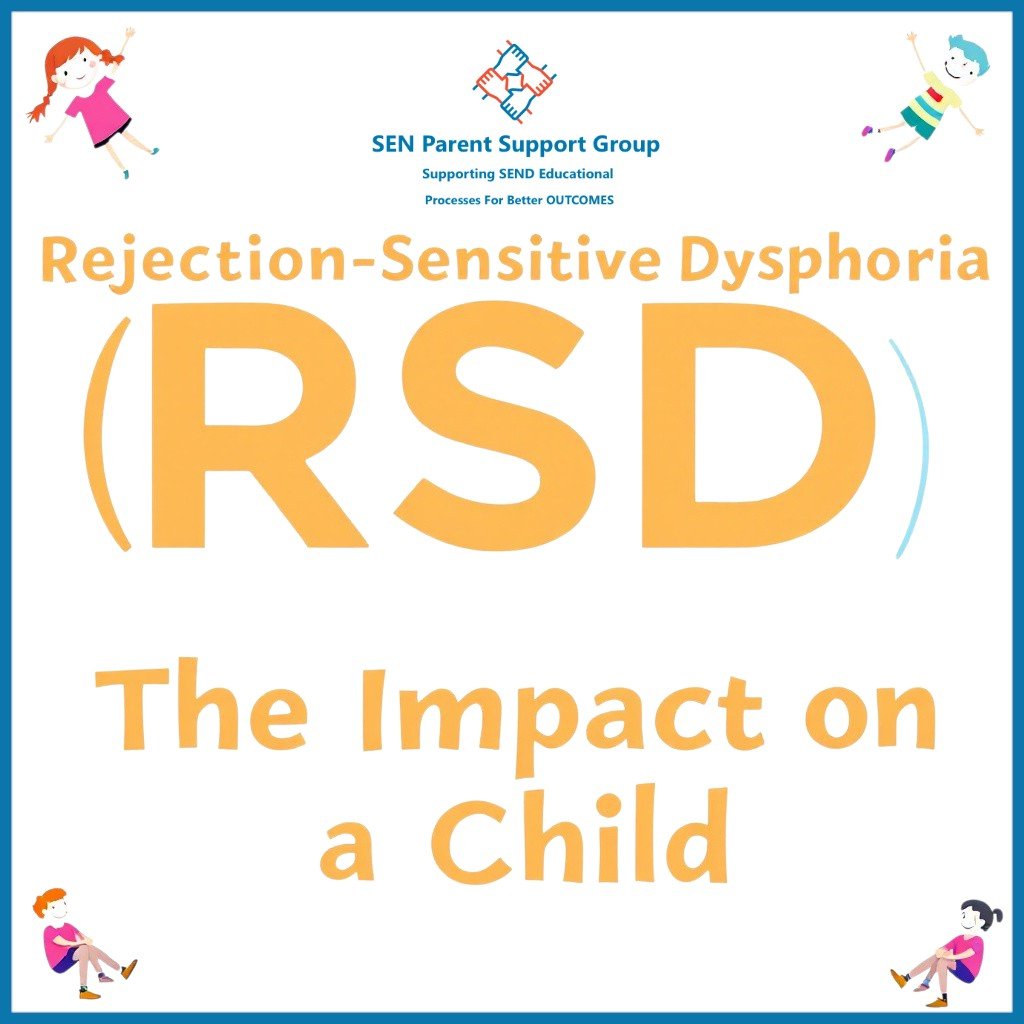SEN Parent Support Group Rejection-Sensitive Dysphoria (RSD) When Every “Not Yet” Feels Like a SEND Knockout:
Rejection Sensitive Dysphoria (RSD) is a gut-wrenching emotional reaction to perceived criticism or rejection. For children, especially those with ADHD, hearing “you could do better” or “try again next time” can feel like a personal attack rather than constructive feedback. In a school context where grades, comments, and comparisons are daily currency, RSD can hijack a child’s confidence and derail their love of learning.
Why the Classroom Amplifies RSD
Children spend a huge chunk of their day in an environment built on evaluation. Every quiz, group project, or teacher remark holds potential for disappointment. Unlike adults, kids often lack the self-soothing tools to separate a red-ink comment from a judgment on their worth. When negative feedback piles up, the emotional burn becomes more intense and longer lasting.
Spotting RSD in School-Age Children
Kids overwhelmed by RSD may:
- Freeze or shut down when corrections arrive
- Withdraw from class discussions after a critique
- Fixate on a single negative comment for hours or days
- Display sudden surges of anxiety before tests or presentations
- Seek constant reassurance from adults or peers
Recognizing these behaviors as RSD rather than “laziness” or “attention-seeking” is the first step toward meaningful support.
Common Classroom Triggers
- Public Corrections
- Being called out in front of classmates.
- A teacher’s tone that feels harsh or impatient.
- Comparative Feedback
- “Your essay is not as detailed as Lisa’s.”
- Grading rubrics that emphasise mistakes over strengths.
- Social Metrics
- Missing an invitation to play or join a group.
- Silence from peers after a comment or joke.
Mapping these triggers helps adults anticipate moments of vulnerability and intervene before the hurt spirals.
Building Resilience: Practical Strategies
- Private Feedback Moments
Schedule one-on-one check-ins to share corrections away from peers’ ears. - Strength-First Language
Pair every critique with specific praise. For example, “Your spelling here is spot-on, and we can work on the structure on line 3.” - Mini Mindfulness Breaks
Teach children a simple breathing exercise—counting to four on the inhale, four on the exhale—before returning to work. - Reframing Together
Role-play how a teacher’s comment can be curiosity, not condemnation. Ask, “What would happen if we tried it this way next time?” - Safe Spaces for Expression
Offer a quiet corner or a journal where kids can dump their frustrations without judgment.
Turning RSD into a Growth Engine
Repeated negative feedback need not be a confidence killer. By embedding self-soothing rituals, reframing critiques as learning clues, and ensuring feedback is balanced with encouragement, children can learn to tolerate and eventually lean into moments of discomfort. Each corrective note becomes data for growth rather than a verdict on their identity.
Beyond the Classroom Walls
To deepen support, consider these next steps:
- Journaling Prompts
Encourage kids to note one thing they did well and one thing they’ll improve tomorrow. - Creative Outlets
Art, music, or drama can help channel emotional overwhelm into self-expression. - Peer Support Circles
Small groups where children share struggles and wins, normalizing setbacks. - Professional Partnerships
An occupational therapist or ADHD coach can introduce tailored coping tools. - Teacher Training
Advocate for staff workshops on RSD, inclusive feedback techniques, and emotional literacy.
Every child deserves to feel seen for what they can do, not defined by what they haven’t mastered yet. By recognizing RSD and weaving intentional strategies into daily school life, we transform a trigger-laden environment into a launching pad for resilience and joy in learning.
If you are a parent struggling to navigate why your child or young person is reluctant to attend school, this could be one of many potential triggers or reasons that your child is unable to explain.
Join other parents “Navigating the SEND Educational Processes for Better Outcomes TOGETHER” Join here: SEN Parent Support Group – Here
Often identifying the child or YP’s needs can be useful. Use this Core Tool to highlight needs to school to form part of the “quantified approach” (APDR) Assess Plan Do Review, which is key to getting your child’s needs met! Click Here
Find us here: click on the link
Share us here:
Need access to our resource hub which includes template letters, quick guides and resources – all categorised for easy access. Subscribe today for your free download and then to Access all Areas which includes 8 CPD Parent Training Webinars. Click a file of interest below to get started!
Understanding SEND
All Things EHCP
- LETTER: LA Failure To Notify If Issuing the plan
- RESOURCE: Moving Local Authorities
- LETTER: Mediation Agreement – LA agreed to issue/amend EHCP but hasn’t provided draft within 5 weeks
- LETTER: Refusal To Assess Won and LA Not Notified of EP Assessment Within 2 wk Timeframe
- LETTER: To LA – After Tribunal – Refusal to Issue. No Draft plan within 5 week timeframe.
Attendance, Exclusions & Sanctions
Complaints
- LETTER – Enforcing Interim Education S43 with LA + Escalation Letter + Tribunal Request
- LETTER: To School When Whole School Approach To Adjustments Is Not Applied Consistently (IEP or EHCP)
- RESOURCE: LGO Outcomes
- LETTER: Right to Choose Rejection 3 Step Complaints Letters
- RESOURCE: Core Deficit Supporting Tool








